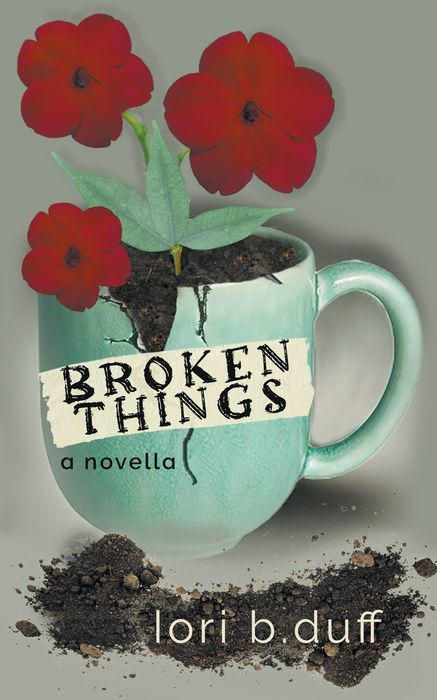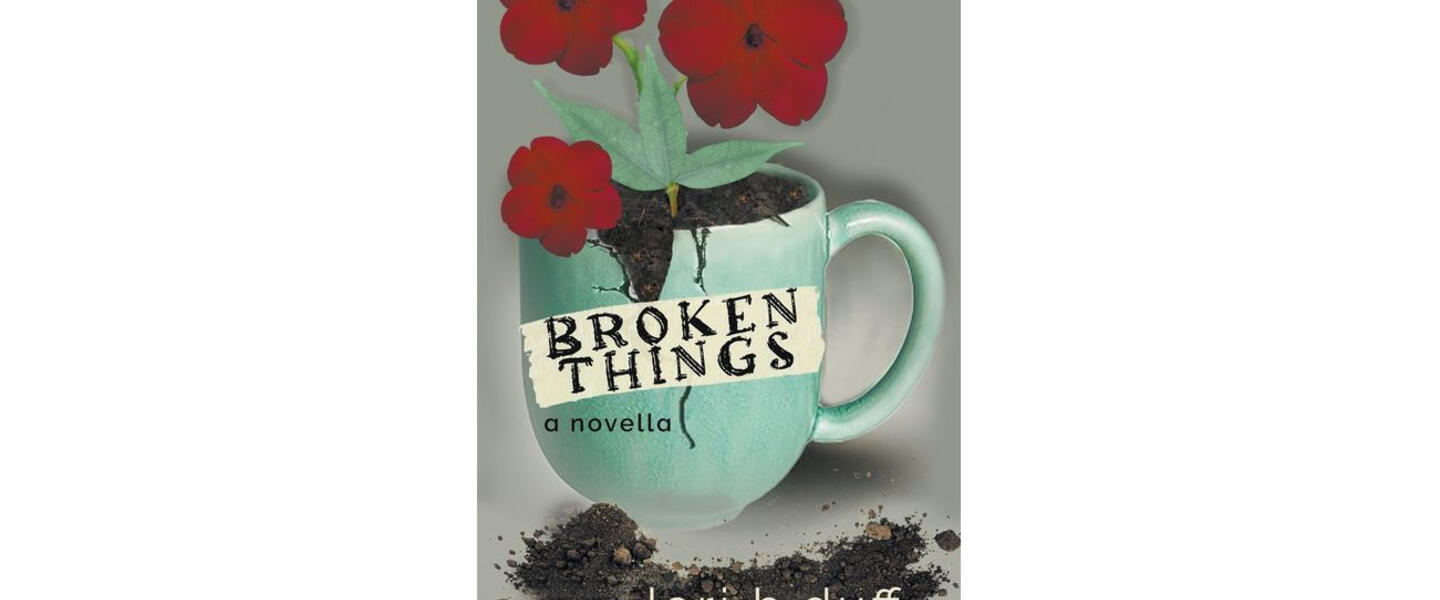
Section Branding
Header Content
Broken Things by Lori Duff
Primary Content
We're all a little bit broken, aren't we? Young widow Tracie Shaw may be more than most. She spends her days hidden away making beautiful treasures out of other people's trash. Her life changes when she finds someone's abandoned ashes in a storage bin auction. When she meets a woman who might have a clue as to where the ashes came from and what they mean, her life turns upside down.

Lori Duff is a two-time winner of the Georgia Bar Journal's fiction competition and a popular humor blogger. Her humorous essays have won multiple awards, including the Foreword Indies Gold Medal for humor, and first place in the National Society for Newspaper Columnists in the humor category. She also writes fiction. Her novella, Broken Things, was released in September 2023, and her novel, Devil's Defense, is forthcoming in 2024 from She Writes Press.
By day, she is the managing law partner of Jones & Duff LLC and wages war for a living. She prefers making people laugh.
Lori is married to her husband of 25 years, Mike, and together they have two children, Jacob and Marin.
TRANSCRIPT:
Orlando Montoya: Coming up in this episode.
Peter Biello: We've had a lot of ghosts in our books in this podcast, haven't we?
Orlando Montoya: Yeah, I don't want to keep count because that might encourage people to send us more.
Lori Duff: We're here for just this brief shining moment, and then when we're gone, we're really gone.
Peter Biello: Is Maria the ghost?
Orlando Montoya: I'm not going to tell you who the ghost is!
Peter Biello: This podcast from Georgia Public Broadcasting highlights books with Georgia connections hosted by two of your favorite public radio book nerds, who also happen to be your hosts of All Things Considered on GPB Radio. I'm Peter Biello.
Orlando Montoya: And I'm Orlando Montoya. Thanks for joining us as we introduce you to authors, their writings and the insights behind their stories, mixed with our own thoughts and ideas on just what gives these works the Narrative Edge.
Peter Biello: All right, Orlando, I understand you have a short book for me today.
Orlando Montoya: Yeah, I read a short book for this episode because the next episode from me is going to be a very, very long book.
Peter Biello: All about the average. Okay, so I think I know which book you're talking about.
Orlando Montoya: That one, that one.
Peter Biello: All right. Well, we'll get to the heavy brick in a few weeks, but tell me about the much lighter book you have for me today.
Orlando Montoya: It's called Broken Things by Lori Duff, a writer from Loganville, east of Atlanta. It clocks in at 105 pages in book form or two hours, 42 minutes as an audiobook, which is how I experienced it. And it's a very cute, inspirational story about grief and loss and loneliness. And it involves a ghost.
Peter Biello: Okay, so perfect for spooky season then.
Orlando Montoya: Spooky season. You know, we got the ghost. It's always going to come back in themes of literary device.
Peter Biello: We've had a lot of ghosts in our books in this podcast, haven't we?
Orlando Montoya: Yeah, I don't want to keep count because that might encourage people to send us more.
Peter Biello: I mean, I'm always down for a good ghost story, but — So where does the book's title come from? Broken Things?
Orlando Montoya: The book's title comes from the main character in the book, a woman named Tracie. And I'll let Lori Duff share a little bit more about her.
Lori Duff: Tracie is a widow, a young widow. She's only in her 30s and her husband died very young, and when he died, she just kind of holed up in her house and she had enough money from the life insurance that she didn't need to work. And so she didn't. And she just really didn't interact with anybody.
Orlando Montoya: And so in her widowhood, Tracie quit her job as a secretary and became an artist. And it's the kind of art that she produces with found objects, you know, bits of things. As she takes a walk, she finds things that people might consider trash like coins, broken glass, and she turns them into figures, into furniture, into objects that hang on the wall and other things.
Peter Biello: And so she's lonely, right? I mean, she's —
Orlando Montoya: I don't get the sense that she's lonely. I get the sense that she's OK with being alone, that she fills her life with art and books and movies. I mean, haven't you known people that — who just always seem to be perfectly content, but they —they're single?
Peter Biello: Sure. It just — in the wake of a big loss like that, I imagine being alone with your grief that — that long is difficult.
Orlando Montoya: Well, I mean, I know people that I — they they don't — they don't seem to go out. They don't seem to have many friends. I check in on them, but they're happy with their gardening and their art and drinking wine out on the front porch.
Peter Biello: I'm guessing if I knew what Tracie was like before her husband died, I might have a better sense of like, how is this really impacting her? Do you see before her husband died at all?
Orlando Montoya: No, we don't. So, that is a good question. But Tracie is content in her creative bubble and seems to be mentally with it until she goes to a storage unit one day, to auction for a delinquent storage unit — customer's possessions, you know the kind.
Peter Biello: Yeah, the storage auction wars or whatever.
Orlando Montoya: So she goes to this storage auction. And among the items in this one storage unit that she gets is someone's ashes.
Peter Biello: Okay, here's the ghost.
Orlando Montoya: Yes. This is where we get the ghost. You got it.
Peter Biello: So strange things start happening once the cremains show up in the house.
Orlando Montoya: Exactly.
Peter Biello: I love it. I love it.
Orlando Montoya: The wind starts to move through the house, or a glass of water falls over, objects are moved.
Peter Biello: Doors slamming, windows opening and closing?
Orlando Montoya: That kind of thing.
Peter Biello: Okay.
Orlando Montoya: She starts having very vivid dreams and even more unusual for her, she befriends someone. She allows someone to bring a little joy into her life. A woman named Maria. And here's where I'll let you know that the author, Lori Duff, got the idea for this story by reading an article about a storage unit auction that did sell someone's cremains, in just the way that I just described. Only that's where the article ends. Lori picks it up and makes a whole story about it and a very delightful story.
Lori Duff: My parents both passed away, in recent years: my mom in the very beginning of COVID and my dad last September. And so that — that just loss has been very much on my mind. And I think that's why, you know, people send me stuff all the time, but I think that's why that article kind of rang something in me that made me want to see, well, you know, I thought, that's so sad because whenever anyone dies, there's somebody who's crying and grieving and feeling this hole in their life. And somewhere between that bit of despair and however many years later, this person just becomes this trash. They just — that's something abandoned that no one cares about anymore. And that — that thought just struck me: that we're here for just this brief shining moment and then when we're gone, we're really gone. We're really gone. And — and it's possible that our memories can be abandoned just as well as our bodies. And I wanted to explore that.
Peter Biello: So these ashes come into Tracie's house. Weird things start happening. And Tracie meets Maria, right? What's going on with Maria? Is she a main character?
Orlando Montoya: Yes, she is. There are actually three main characters by the time we get to the middle of the story: There's Tracie, Maria and a third character that I'll get to in just a bit. But Maria, I can't remember her age or profession or if those things are even mentioned in the story, but Maria literally bumps into Tracie at a store. The two strike up a conversation and it ends up that Maria really wants Tracie to teach her how to make art.
Peter Biello: Oh okay. So why doesn't Maria just go to art class, though, as opposed to like asking Tracie to do it? She could watch some YouTube. Tune into some Bob Ross.
Orlando Montoya: I don't know. But Maria is persistent. She's like, "When are you going to teach me art? When are you going to teach me art," you know. And eventually they start making art together.
Lori Duff: They both recognized something in each other. And the story is written from Tracie's perspective, so we don't really get to see what Maria thinks, but. Tracie sees Maria and she's just kind of stunned, like, I know this person. I don't know how I know this person. And she's having this weird day because she's just basically incorporated a ghost into her being and she has all these thoughts and feelings and tastes that are not her own and she doesn't know what to do with it. And she she sees Maria and just instantly recognizes her as something someone important. But she can't quite figure out who she is. And it never really says in the book. But I, I like to think that Maria recognized something in Tracie, too.
Orlando Montoya: So Tracie and Maria start making art together. They pour wine together, they eat, they'll talk about their lives. So Tracie is kind of like doing everything that she used to do. Except now there's Maria. And to the best of my recollection, they don't interact anywhere but in Tracie's home or Tracie's home studio. But now Tracie has a friend.
Peter Biello: Okay. And so I'm struck by the phrase, "incorporate the ghost" into her. Right? That's what she said. And. And is that. Does that mean that, like, the ghost has somehow influenced this relationship between Tracie and Maria?
Orlando Montoya: Yes. We can definitely say that the ghost is responsible for what's going on.
Peter Biello: Okay, the way you're saying that makes me think Marie is a ghost. Is Maria the ghost?
Orlando Montoya: I'm not going to tell you who the ghost is! No, I'll tell you. Maria is not the ghost.
Peter Biello: Okay.
Orlando Montoya: The ghost is the third character: A woman named Evelyn.
Peter Biello: Okay.
Orlando Montoya: And she, Evelyn, has a whole story of her own. A whole back life of her own, told over several chapters. And again, I'm not going to reveal too much about it because I think that's the whole, like, heart of the story is how the Evelyn relates to Tracie and Maria. And like I said, it's very short, very short book.
Peter Biello: Okay. And this is not going to end up being kind of a rip off of The Sixth Sense.
Orlando Montoya: And so I have to admit, I've never seen The Sixth Sense.
Peter Biello: Oh! Okay. I mean, the spoiler of that is like he was dead the whole time. Like, he didn't know he was dead.
Orlando Montoya: No. Evelyn ... Evelyn appears to Tracie in her dreams.
Peter Biello: Okay!
Orlando Montoya: And then Evelyn starts talking to Tracie. So, yeah, Evelyn is not a physical character.
Peter Biello: Okay, So this is not — this is not a rip off of that. It's just a straight up new ghost story. I love it. So — so someone can read this essentially, and get to the heart of it in pretty much no time.
Orlando Montoya: Yeah, like I said, the whole thing is like two hours on audiotape. And so, you know, I think you get to it very quickly. And the heart of the story is very poignant, very personal. I didn't really ask Lori about what she thought the book's takeaway messages were. Maybe I should have. But sort of the takeaways that I took were things like, you know, be honest and authentic; love and accept people for who they are; whatever burdens you have in your life, lay them down. And most of all, take emotional risks. Come out of your shell and stop hiding.
Lori Duff: I think it's Bambi, the beginning of Bambi, the cartoon. Where spring comes and all the animals come out rubbing their eyes and like they're all waking up from this long, deep sleep. And that's kind of how I felt when we were able to emerge from our houses after COVID. And I think that's how Tracie feels emerging from her house after this almost decade of mourning.
Orlando Montoya: And at the end of the book, I can say that everyone's broken pieces are mended and we learn that Tracie, Maria, and the ghost are all connected and the resolution takes all of them coming together like it never could have happened individually, which I guess is another takeaway of the story. But as the way the story spins out, you don't know that right away. It's just a wonderfully written story.
Peter Biello: And I wonder, too, since she mentioned COVID, if there's a statement in the book, too, about COVID and its effect on us.
Orlando Montoya: I did ask her about COVID. And yes, she said that the isolation of COVID weighed on her like it did for many people. But really, the book is about, as the title suggests, mending of broken things. And here's Lori talking about Tracie.
Lori Duff: She talks a little bit about in the book about the Japanese art of kintsugi. And I think that's so lovely to take a broken thing and fill in the cracks with — In Japan, they'd fill it with something precious like gold and make the — the fixed object more beautiful than the original and has, it's considered to have more character than the original. And I think that's true of people: that if you have a — If you just sail smoothly your whole life, you're not going have that much to talk about.
Peter Biello: So is this spooky? Like, are you kept on the edge of your seat with the way this is written? Like a scary novel?
Orlando Montoya: I am kept on the edge of my seat, but not for being scary or something bad is going to happen. I want to know who is this person Evelyn? What's their story? How are they all connected? And the ghost is — is a very friendly and helpful presence.
Peter Biello: I see. Okay, so a literary novel with elements of the supernatural, but not a spooky ghost story.
Orlando Montoya: No.
Peter Biello: Yeah. Okay. So what gives this book the Narrative Edge?
Orlando Montoya: It's cute. It's cute, it's quick, it's got a message, and it's got a ghost. I love it.
Peter Biello: Wonderful. All right. Well, the book is called Broken Things by Lori Duff. Orlando, thanks so much for telling me about it.
Orlando Montoya: Right. Happy to do it.
Peter Biello: That's great. What do you think?
Orlando Montoya: Boo.
Orlando Montoya: Thanks for listening to Narrative Edge. We'll be back in two weeks with a brand-new episode. This podcast is a production of Georgia Public Broadcasting. Find us online at gpb.org/narrative edge.
Peter Biello: You can also catch us on the daily GPB News podcast Georgia Today for a concise update on the latest news in Georgia. For more on that and all of our podcasts, go to GPB.org/Podcasts.








